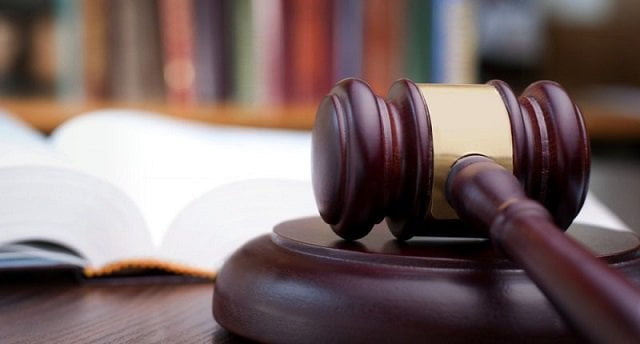Maryam’s bail may augur well for NAB accused
Legal experts believe all high courts need to adopt a uniform, consistent approach on bail

Representational image. PHOTO: REUTERS
It is being discussed in the bar rooms whether the key opposition political leaders – including Pakistan Peoples Party Co-chairman Asif Ali Zardari – who are behind bars without proven guilty, may also be able to get relief after the Lahore High Court (LHC) judgment in Maryam case.
The LHC in its interim bail order on Monday noted that no satisfactory reparation can be offered to an innocent man for his unjustified incarceration at any stage of the case albeit his acquittal in the long run.
Section 9(b) of the National Accountability Ordinance, 1999 ousts the jurisdiction of all courts to grant bail to any person accused of committing an offence under the said ordinance.
However, soon after the promulgation of NAB law, the Supreme Court in the 2003 Asfand Yar Wali case allowed high courts to grant bail to the accused persons in ‘extraordinary circumstances’ and hardship cases.
In October last year, a five-judge larger bench of the apex court while hearing Talat Ishaq case had reiterated that bail could not be granted over delay in trial. Chief Justice of Pakistan (CJP) Asif Saeed Khosa had authored the judgment.
Soon after the announcement of the judgment, the high courts – especially the Islamabad High Court (IHC), adopted a conservative approach by not granting bail to the NAB accused.
Strict parameters set for corruption cases have discouraged accused persons from approaching courts to seek bail in the recent past. A number of political leaders like former premier Shahid Khaqan Abbasi, former finance minister Miftah Ismail, and former president Zardari have not sought bail in high courts.
Senior lawyers were also showing concern about the prevailing situation wherein courts were not granting relief to NAB accused and they are behind bars without being proven guilty.
However, the recent LHC judgment in Maryam’s case has opened a window for the opposition figures, who are behind bars on basis of weak cases. Now they can approach the high court for bail.
The LHC division bench, comprising Justice Ali Baqar Najafi and Justice Sardar Ahmad Naeem, in its judgment pronounced on Monday also discussed the importance of bail to the accused persons. It also considered the apex court judgments for the purpose.
The LHC, commenting on the SC judgment in Talat Ishaq case, said the SC’s verdict does not totally oust jurisdiction of high court under Article 199 for the simple reason that the constitutional jurisdiction is always attracted where there is absence of alternate and efficacious remedy.
“However, besides considering the hardship of the case, merits of the case will always be taken into consideration at the time of deciding of bail application.”
The high court noted that it is true that corruption and corrupt practices are rampant in society and are needed to be curbed with an iron hand but at the same time, this court cannot keep its eyes off the legal proposition that bail cannot be withheld as a punishment since this court would otherwise transgress into the power of the trial court to return its finding upon guilt on the basis of evidence.
The court also referred the apex court’s 2003 judgment in the Abdul Aziz Khan Niazi case, wherein it was held that the ultimate conviction and incarceration of a guilty person can repair the wrong caused by a mistaken relief of bail granted to him, but no satisfactory reparation can be offered to an innocent man for his unjustified incarceration at any stage of the case albeit his acquittal in the long run.
The high court also reproduced two paragraphs of the SC’s 2003 verdict. Interestingly, the LHC also noted that the apex court in recent judgment did not consider its earlier 2003 verdict.
In view of the LHC judgment, the legal experts believe that other NAB accused will also get benefit. However, they say there is a need that all high courts should have consistent and uniform view in bail petitions.
After Talat Ishaq case, the IHC is very strict in bail cases while the LHC recent verdict shows that the oldest and largest high court has liberal view in bail matters.
Interestingly, the LHC has also granted bail to former prime minister Nawaz Sharif but the IHC is granting him interim bail. Barrister Asad Rahim Khan believes that the LHC judgment will apply squarely to other cases of opposition leaders, who are behind bar without proving guilty.
A senior lawyer said though one high court’s judgment is not binding on others high courts but it will have effect on them. During tenure of the CJP Khosa, NAB accused hardly get relief in the apex court.
The accused’s appeals in Ashiana scam case are pending and could not be decided in the apex court for the last 16 months. Senior lawyers also say there will be visible change in superior judiciary after retirement of CJP Khosa whose view about grant of bail to NAB accused is very strict.
A senior lawyer said all laws whether common or special are subservient to the Constitution that guarantees right to life. He said narrow interpretation cannot defeat constitutional guarantees.

1724912122-0/Untitled-design-(1)1724912122-0-208x130.webp)

















COMMENTS
Comments are moderated and generally will be posted if they are on-topic and not abusive.
For more information, please see our Comments FAQ